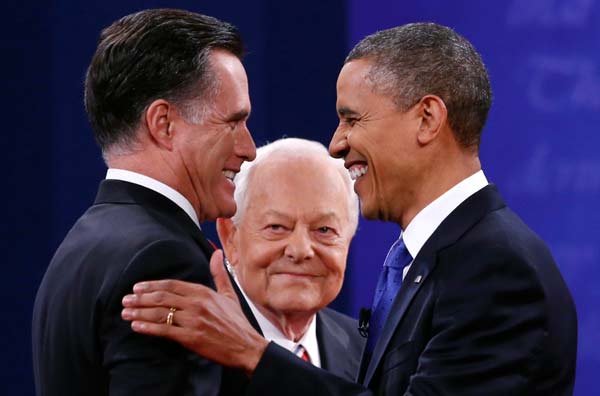Obama, Romney voice similar views on China
 0 Comment(s)
0 Comment(s) Print
Print E-mail China Daily, October 24, 2012
E-mail China Daily, October 24, 2012
The next US president will continue to seek China's help, despite any harsh campaign rhetoric, as long as the economy remains in the doldrums, analysts said.
|
|
|
Republican presidential candidate Mitt Romney and US President Barack Obama exchange greetings before they begin their final debate at Lynn University in Boca Raton, Florida, on Monday. [Kevin Lamarque/Reuters] |
US President Barack Obama and his challenger Mitt Romney revealed increasing similarities in their China policies in their final debate in Florida on Monday night.
Romney, often labeled as hawkish on China, softened his tone markedly by saying "China doesn't have to be an adversary".
Repeating his campaign mantra that he would "label China a currency manipulator on day one", Romney also emphasized that China, "having an interest that's very much like ours", wants "the economy to work and the world to be free and open".
"We can be a partner with China — we don't have to be an adversary in any way, shape or form. We can work with them, we can collaborate with them — if they're willing to be responsible".
Li Haidong, a professor from the Institute of International Relations at China Foreign Affairs University, said Romney's tone toward China, the biggest foreign creditor to the US, had softened.
Obama declared China both an "adversary" and a "potential partner" by outlining how he set up a special taskforce to enforce trading rules and brought a series of successful trade cases against Beijing.
Whatever the intent, talking tough on China has become the norm for politicians of both parties.
The debate on China focused primarily on economic ties.
Both men used the China question to occasionally address domestic affairs, without mentioning human rights.
Ruan Zongze, vice-president of the China Institute of International Studies, said the economy is the main topic in the election.
Obama and Romney clearly know the importance of China to any economic recovery, but they still tend to label China as the scapegoat for long-term problems, Li said.
Li also rejected Romney's assertion that China would lose any potential trade war, warning that both countries would suffer.
Kenneth Lieberthal, China specialist at the Brookings Institution, said that it was a bit surprising to hear Romney sounding like Obama during the debate. "Throughout the whole debate, Romney tried to convey that he is, in reality, a moderate on foreign policy and he was trying to be presidential," he said.
He noted that it was a "very positive statement" from Romney saying China could be a partner and the challenger did not mention building up the US military presence in Asia as he had before.
Both men fundamentally shared the same view that the US can have a productive future, and good economic relations, with China but Washington needs to get its own house in order before dealing with other countries, Lieberthal said.
Both Obama and Romney want good relations with China, said Niu Xinchun, vice-president of the Institute of American Studies at the China Institutes of Contemporary International Relations.
The reaction was analytical on Sina Weibo, China's largest micro-blogging platform.
Zhou Anli, editor at the website of business magazine BNET China, said on her micro blog on Tuesday that it's unnecessary to pay too much attention to their words since what's important is how many promises can be realized after the election.
A CNN poll showed that 48 percent of Americans believed Obama won the debate against 40 percent for Romney.
"I think both did well tonight, but Obama did better," said Bonnie Glaser, Asian security expert at the Center for Strategic and International Studies.
"Romney's views on China and his policies, if elected, remain unclear. He continues to insist he would label China a currency manipulator on day one in office, but he seems to appreciate the need for a cooperative relationship with China overall."
Since taking office in January 2009 there have been an unprecedented number of high-level exchanges between Chinese and US officials, including 12 meetings between President Hu Jintao and Obama.
US-China Business Council President John Frisbie said Washington should focus more on engagement with China instead of confrontation.
"Both presidential candidates have said they will 'get tough' on China, but evidence has shown that the best way to make progress is through comprehensive engagement and legal action — not political rhetoric," he said.
A recent survey by the council shows that more than 90 percent of US companies invested in China mainly to serve the Chinese market, not to outsource production and export back to the US.
Since 2000, US exports to China have soared 542 percent against just 80 percent to the rest of the world.







Go to Forum >>0 Comment(s)